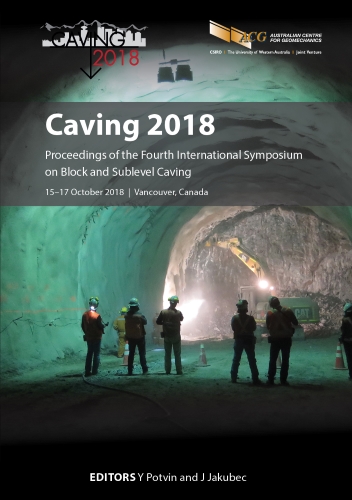Grade control and segregation at New Gold’s New Afton block cave operation, Kamloops, British Columbia

|
Authors: Henning, MG |
DOI https://doi.org/10.36487/ACG_rep/1815_08_Henning
Cite As:
Henning, MG 2018, 'Grade control and segregation at New Gold’s New Afton block cave operation, Kamloops, British Columbia', in Y Potvin & J Jakubec (eds), Caving 2018: Proceedings of the Fourth International Symposium on Block and Sublevel Caving, Australian Centre for Geomechanics, Perth, pp. 141-148, https://doi.org/10.36487/ACG_rep/1815_08_Henning
Abstract:
New Gold's New Afton Cu–Au–Ag block cave mine is located near Kamloops, British Columbia and is composed of four production blocks situated along the deposit plunge. As a result of mineralisation contacts and geometry, certain production drawpoints are designed in waste or low-grade ore targeting higher column ore. When underground production is outperforming milling rates, the operation yields the ability to segregate waste and intermediate grade (IG) material for stockpiling. The benefits of stockpiling waste and IG include increased metal production, as well as lowering both process water demand and tailings storage requirements. Continued studies are ongoing to further refine and optimise segregation efficiencies at the New Afton mine and include live belt copper scanning technology combined with an automated diverter. The goal is to minimise rehandling, reduce waste/intermediate grade/ore blending and further maximise profits.
Keywords: segregation, conveyor analyser, production, cash flow
References:
Dassault Systèmes 2018, PCBC, computer software, Dassault Systèmes, Paris, https://www.3ds.com/products-services/geovia/products/pcbc/
Hall, R & May, B 2013, ‘Geology of the New Afton porphyry copper-gold deposit, Kamloops, British Columbia’, in JM Logan &
TG Schroeter (eds), Canada Society of Economic Geologists Field Trip Guidebook, Series 43, pp. 117–128.
Lipske, J & Wade, W 2014, Geological Model of the New Afton Copper and Gold Deposit, British Columbia, internal report, New Gold Inc., Vancouver.
Logan, JM, Mihalynuk, MG, Ullrich, T & Friedman, RM 2007, ‘U-Pb ages of intrusive rocks and 40Ar/39Ar plateau ages of coppergoldsilver mineralization associated with alkaline intrusive centres at Mount Polley and the Iron Mask batholith, southern and central British Columbia’, Geological Fieldwork 2006, Ministry of Energy, Mines and Petroleum Resources, Vancouver, paper 2007-1, pp. 93–116.
© Copyright 2026, Australian Centre for Geomechanics (ACG), The University of Western Australia. All rights reserved.
View copyright/legal information
Please direct any queries or error reports to repository-acg@uwa.edu.au
View copyright/legal information
Please direct any queries or error reports to repository-acg@uwa.edu.au
